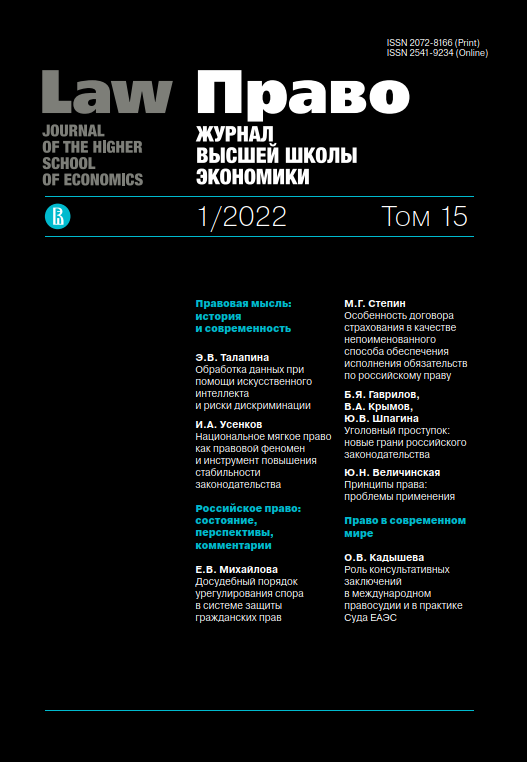Principles of Law: Problems of Enforcement
Abstract
Federal Law «On Mandatory Requirements in the Russian Federation» defines the rules for «better regulation» for economic relations. The Law pursues the idea of the regulatory lifecycle with engaging the public in the development of regulatory acts and evaluating their influence on business, society and State. Also, the Law defines the principles to be applied in these processes (principles for establishing and evaluating the application of mandatory requirements). In the article the principles of law are considered on the example of the principles stipulated by the Federal Law. The content of these principles gives reason to assume that they have a constitutional nature disclosed in the decisions of the Constitutional Court of the Russian Federation. This may mean that the content of the principles of establishing and assessing the application of mandatory requirements is broader than literally formulated in Federal Law and in practice can be supplemented by the positions of the Court in terms of understanding the relevant principles. Therefore, the main purpose of this article is to demonstrate the constitutional nature of the principles and show their content and usage. Author claims that the principle of legality, the principle of substantiation of mandatory requirements, the principle of enforceability of mandatory requirements develop the constitutional principles of proportionality of restrictions on rights and freedoms, balance of private and public interests, forming a test for proportionality of restrictions generated by mandatory requirements. In the article it is also shown that the principle of legal certainty and consistency, the principle of openness and predictability are based on the principle of maintaining confidence in the actions of the state, arising from the constitutional principles of legal equality and justice. In considering the principles of the Law, the author focuses on their regulatory potential and problems of implementation, including the issues of regulatory impact assessment and ex post evaluation. Moreover, the article examines the legal content of the basic notions of the Federal Law: mandatory requirements, legally protected values, the risk of harm (damage) to legally protected values.
References
Bogdan V.V., Grineva A.V. (2018) On judicial precedent as a way to minimize private and public legal risks: discussion issues. Rossiiski sudia=Russian judge, no 11, pp. 4952 (in Russ.)
Bondar' N.S. (2009) Constitutional Values as a Category of Current Law (in the Context of the Practice of the Constitutional Court of Russia). Zhournal Constitutioni Justicii=Journal of Constitutional Justice, no 6, pp. 1-11 (in Russ.)
Bychkova O.V. (2018) «Smart Regulation»: how to prevent unreasonable regulatory rules: a textbook. Saint Petersburg: European University, 392 p. (in Russ.)
Gadzhiev G.A., Barenboim P.D., Lafitskii V.I., Mau V.A., Zakharov A.V., Mazaev V.D., Kravchenko D.V., Syrunina T.M. (2010) Constitutional Economics. Moscow: Justitsinform. 258 p. (in Russ.)
Garmaev Yu.P., Ivanov E.A., Markuntsov S.A. (2020) Anti-Corruption Compliance in the Russian Federation: Interdisciplinary Aspects. Moscow: Jurisprudence, 330 p. (in Russ.)
Davydova M.L. (2020) “Smart regulation” as a basis for improving modern lawmaking. Zhournal Rossiiskogo prava=Journal of Russian Law, no 11, pp. 14-29 (in Russ.) DOI: https://doi.org/10.12737/jrl.2020.130
Drahos P. (2017) Regulatory theory: foundations and applications. Canberra: The Australian National University Press. 820 p.
Karapetov A.G. (2016) Economic analysis of law. Moscow: Statut, 528 p. (in Russ.)
Lapina M.A. (2015) Theoretical and legal aspects of risk management. Gosudarstvo I Pravo=State and law. no 2, pp. 35-44 (in Russ.)
Lapina M.A., Karpukhin D.V. (2014) Civil Law and Public Law Risks in Entrepreneurial Activity. Economika i Upravlenie=Economics and Management, no 4, pp. 85-90 (in Russ.)
Mastenbroek E., van Voorst S., Meuwese A. (2016) Closing the regulatory cycle? A meta evaluation of ex-post legislative evaluations by the European Commission. Journal of European Public Policy, vol. 23, no 9, pp. 1329-1348. DOI: https://doi.org/10.1080/13501763.2015.1076874
OECD Regulatory Policy Outlook (2018). OECD Publishing, Paris, 252 p.
Tikhomirov Yu.A., Talapina E.V. (2020) Law as an effective factor of economic development. Pravo. Zhurnal vysshey shkoly ekonomiki=Law Journal of Higher School of Economic. no 1, pp. 4-26 (in Russ.) DOI: https://doi.org/10.17323/2072-8166.2020.1.4.26
Tikhomirov Yu.A. (2017) Risk in the Focus of Legal Regulation. Law and Modern States, no 6, pp. 9-23 (in Russ.)
Tikhomirov Yu.A. (2016) Risk in Law: Nature and Reasons. Law and Modern States, no 6, pp. 9-19 (in Russ.)
Voloshinskaya A.A., Komarov V.M. (2015) Evidence-based public policy: problems and prospects. Vestnik Instituta Ekonomiki RAN=Bulletin of the Institute of Economics of the Russian Academy of Sciences, no 4, pp. 90-102.
Copyright (c) 2022 Law Journal of the Higher School of Economics

This work is licensed under a Creative Commons Attribution-ShareAlike 4.0 International License.


















